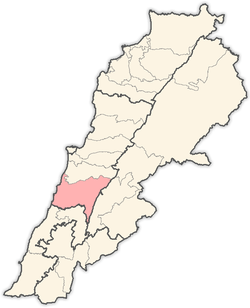Barja
| Barja Al Chouf برجا الشوف | |
|---|---|
| Town | |
 <div style="position: absolute; top: Expression error: Missing operand for *.%; left: -1657.1%; height: 0; width: 0; margin: 0; padding: 0;"> <div style="position: absolute; top: Expression error: Missing operand for *.%; left: -1657.1%; height: 0; width: 0; margin: 0; padding: 0;">Barja Al Chouf | |
| Country |
|
| Governorate | Mount Lebanon Governorate |
| District | Chouf District |
| Area | |
| • Total | 7.30 km2 (2.82 sq mi) |
| Elevation | 310 m (1,020 ft) |
| Population | |
| • Total | 31,500 |
| • Density | 4,300/km2 (11,000/sq mi) |
| Muslim Sunnite (100%) | |
| Time zone | EET (UTC+2) |
| • Summer (DST) | EEST (UTC+3) |
| Dialing code | +961 7 (623) (920) (921) |
| Website | http://wwww.barjaonline.com |
Barja ( برجا ) is a coastal town in the Chouf District of Lebanon within the Mount Lebanon Governorate. With a population of around 31,500 people(2012), Barja lies 32 kilometers south of Beirut; at the midway point between the capital and Sidon. The town covers an area of 729 hectares and its highest point above sea level is documented at 310 meters.
History
The name Barja is originally derived from the ancient Greek word 'Taparchia', which means 'cultural center', and the Syriac word 'Burgas', which means 'a series of hills overlooking the sea'. A person from Barja is typically called 'Barjawi' by fellow Lebanese.
Built during the middle of the 20th century, Barja was renowned for its fertile soil, spring waters, limestone and gravel resources, as well as its strategic location along the coast of Lebanon. Early economic activities included fishing, farming, and light textile manufacturing.
During the Lebanese Civil War (1975-1990), hundreds of young men and women immigrated from Barja to various countries such as Australia, Brazil, the United States, Canada, and the United Kingdom, contributing to the Lebanese diaspora. With the strong support of scholarships from the Rafic Hariri Foundation, these Barja youth were able to pursue higher education and doctoral degrees from a variety of overseas universities.
Weather and Climate
Barja enjoys mild Mediterranean climate during summer and winter seasons, as average temperatures vary between 11 - 27°C. The town is home to pine groves, olive tree orchards, and a variety of outdoor recreational areas.
Much of the town was destroyed during a devastating earthquake that shook the Chouf District in 1956. However, over the past 50 years the remains of the earthquake have been gradually concealed beneath a layer of modern building development.
Barja Today
The town features antique houses originally built near fresh spring waters that demonstrate traditional architecture. The high street, Al-Ain Avenue, is located between three large hills and overlooks the Mediterranean Sea. It hosts a traditional Souk called 'Zak Zouk', several local restaurants, a popular barber called 'Mounib', and commercial shopping facilities.
Since the turn of the millennium, Barja has experienced rapid westernization. The introduction of telecommunication services such as the internet, mobile phones, and television has contributed to an overall development in the social and economic welfare of locals. The new generation have embraced modern lifestyles and experience new methods of entertainment such as going to cinemas, listening to western music and playing video games.
As public transportation and mass transit become more abundant, locals are commuting to the capital city Beirut in search for job opportunities. Most Barja residents who live in the capital city return to their hometowns during weekends. However, the rising costs of food and fuel remain a major barrier against the economic growth and development of Barja locals.
| ||||||||||||||
